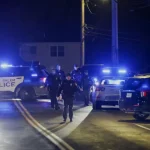
Political commentator Rogan O’Handley has asked the U.S. Supreme Court to hear his case regarding a California law that empowers state officials to counteract “misleading” election information on social media platforms.
In 2021, O’Handley sued California in federal district court over communications the state had with Twitter alleging that he was posting disinformation on the platform about the 2020 election.
He argued that the government’s action of flagging his post was a violation of the First Amendment right to free speech.
California countered that it was merely lawfully communicating its views to social media platforms, which then ultimately decided whether to remove the content the state identified as wrongful.
O’Handley — who goes by the handle @DC_Draino on the platform — posted a week after the election on Nov. 12, 2020: “Audit every California ballot. Election fraud is rampant nationwide and we all know California is one of the culprits. Do it to protect the integrity of that state’s elections.”
Audit every California ballot
Election fraud is rampant nationwide and we all know California is one of the culprits
Do it to protect the integrity of that state’s elections
— DC_Draino (@DC_Draino) November 13, 2020
Then-California Secretary of State Alex Padilla’s Office of Elections Cybersecurity contacted Twitter about the post.
“Hi, We wanted to flag this Twitter post [f]rom user @DC_Draino. In this post user claims California of being a culprit of voter fraud, and ignores the fact that we do audit votes,” the office said, according to the lawsuit.
Do you think this law should be struck down?
Yes: 100% (1 Votes)
No: 0% (0 Votes)
“This is a blatant disregard to how our voting process works and creates disinformation and distrust among the general public,” it added.
O’Handley’s lawsuit said Twitter responded by applying the following label to his tweet: “This claim of election fraud is disputed, and this Tweet can’t be replied to, Retweeted, or liked due to a risk of violence.”
Twitter also issued a strike against O’Handley’s account. The social media platform ultimately suspended him on February 22, 2021, following other tweets the company deemed violated its rules.
In his January 2022 ruling against O’Handley, U.S. District Judge Charles Breyer of the Northern District of California concluded that O’Handley had not proven California directly infringed on his free speech rights by the act of communicating with Twitter its views of his content, and he dismissed the case.
The 9th U.S. Circuit Court of Appeals upheld the ruling in March. While acknowledging it was “possible to draw a causal line from the OEC’s flagging of the November 12th post to O’Handley’s suspension,” the court found there was no “state action” for O’Handley to challenge under the First Amendment.
The judges added that Twitter “acted under the terms of its own rules, not under any provision of California law,” when it suspended O’Handley.
“That Twitter and Facebook allegedly removed 98 percent of the posts flagged by the OEC does not suggest that the companies ceded control over their content-moderation decisions to the State and thereby became the government’s private enforcers,” they said.
“It merely shows that these private and state actors were generally aligned in their missions to limit the spread of misleading election information,” the judges found.
O’Handley appealed his case to the Supreme Court in June. The justices must still decide whether they will take it up.
In his brief, the conservative commentator argued that government officials are free to engage in the modern public square of social media as much as anyone else, but “they must do so consistent with the First Amendment.
“There is no 21st-century exception to the longstanding rule that the government cannot suppress or retaliate against views it doesn’t like,” he contended.
“State officials crossed constitutional lines here, discriminating on the basis of viewpoint and then claiming their own speech warranted more protection than that of private citizens,” O’Handley said.
He noted that Twitter had never censored his speech until California’s OEC flagged his account.
Several conservative groups — including America’s Future, the Free Speech Coalition and Gun Owners of America — have submitted an amicus brief urging the Supreme Court to take up O’Handley’s case.
“California pressured Twitter to censor and deplatform [O’Handley] for five tweets challenging the integrity of recent elections,” the brief said.
“California claims to be acting based on the highest motives to preserve faith in elections by protecting the public from hearing false and misleading information,” it said.
“The reality is that government officials censor to protect their power over the People — not to protect the People. In fact, the People would have greater faith in elections if California did not censor criticism about how those elections are being conducted,” the brief said.
The amicus brief noted that California was free to advance its view that the election was conducted with integrity on social media or otherwise, but the problem was “it was covertly conspiring to have a private party censor the opposing view — while implicitly threatening that private party if it failed to cooperate.”
“California denies that it did anything to pressure or coerce Twitter to censor Petitioner,” it said. “The Ninth Circuit analyzed only one California election-related law before concluding that California had no power over Twitter, while ignoring the myriad other criminal and other laws which California could have employed if Twitter had disregarded California’s ‘request.’”
In July, a Louisiana-based U.S. district judge issued a preliminary injunction barring the federal government from communicating with social media companies.
The Department of Justice appealed the matter to the 5th U.S. Circuit Court of Appeals, which agreed to lift the injunction while the case makes its way through the court system.






